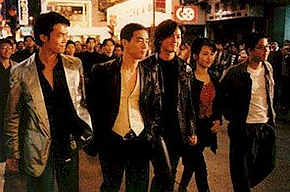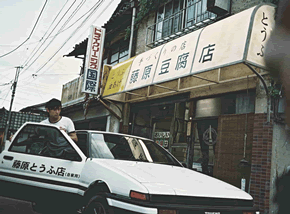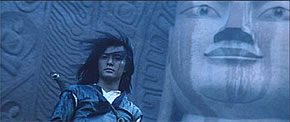|

By
Gabriel Chong & Linus Tee |
10 September 2010
If there is one genre that defines the Hong Kong film industry, it would undoubtedly be
the ‘gu wak zai’ movies. After all, the most successful Hong Kong films of the 1990s and
2000s belonged to that genre- think the “Young and Dangerous” movies and the “Infernal
Affairs” trilogy. And behind those iconic “gu wak zai” movies was one man called Lau Wai-
Keung, better known as Andrew Lau, who with both franchises, breathed life- not once, but
twice- into an industry threatening to fall into a long deep slumber.
 The 50-year-old filmmaker is the director behind the six Young and Dangerous movies and
one Young and Dangerous prequel in the late 1990s, and the director of all three Infernal
Affairs movies in the early 2000s. If you combine the box-office receipts from all these
movies, Andrew Lau would very likely rank as the top box-office draw in Hong Kong- much
like the position James Cameron enjoys in Hollywood. The 50-year-old filmmaker is the director behind the six Young and Dangerous movies and
one Young and Dangerous prequel in the late 1990s, and the director of all three Infernal
Affairs movies in the early 2000s. If you combine the box-office receipts from all these
movies, Andrew Lau would very likely rank as the top box-office draw in Hong Kong- much
like the position James Cameron enjoys in Hollywood.
This month, Andrew Lau takes on the fictional Chinese hero Chen Zhen, made popular by
Bruce Lee through his martial arts classic Fist of Fury (1972) and Jet Li through the equally
iconic Fist of Legend (1994). His new “Legend of the Fist: The Return of Chen Zhen” sees
Donnie Yen in the titular role, which Donnie had once played in a TV series back in 1995. besides a star-studded cast including Shu Qi and Anthony Wong, the script is written by
Hong Kong veteran Gordon Chan (incidentally, Gordon also wrote and directed the 1994 Jet
Li film).
 As a sign of Andrew Lau’s recognition, the film was selected as the second opening-night
film of the Venice Film Festival (Lau right with actors Donnie Yen and Shawn Yue, courtesy of wireimage.com) and has also been chosen to be screened at the Toronto
International Film Festival. It is an honour that few Hong Kong directors can lay claim to, but
really, how many directors in Hong Kong can claim to have enjoyed the same commercial
and critical success that Andrew Lau has enjoyed since he started out as a director 20 years
ago? As a sign of Andrew Lau’s recognition, the film was selected as the second opening-night
film of the Venice Film Festival (Lau right with actors Donnie Yen and Shawn Yue, courtesy of wireimage.com) and has also been chosen to be screened at the Toronto
International Film Festival. It is an honour that few Hong Kong directors can lay claim to, but
really, how many directors in Hong Kong can claim to have enjoyed the same commercial
and critical success that Andrew Lau has enjoyed since he started out as a director 20 years
ago?
Andrew Lau first started his craft as an assistant cinematographer with the legendary Shaw
Brothers studios, and was promoted to cinematographer in 1985. Known for his ability in
shooting action films using handheld cameras, he honed his skill in films such as Ringo
Lam’s “City on Fire” (1987) and Wong Kar-Wai’s “As Tears Go By” (1988) (which earned him
his first Hong Kong Film Award for Best Cinematography).
 He made the leap into the director’s chair with the Danny Lee police drama “Against
All” (1990). Andrew explained his decision to become a director in an interview with HK
Cinemagic: “I've worked as a cinematographer on so many films. Of course, I like directing,
so I can be in control of the cinematography, the acting, etc. In Hong Kong , normally the
actors have a lot of control, but I need to fully control everything.” He made the leap into the director’s chair with the Danny Lee police drama “Against
All” (1990). Andrew explained his decision to become a director in an interview with HK
Cinemagic: “I've worked as a cinematographer on so many films. Of course, I like directing,
so I can be in control of the cinematography, the acting, etc. In Hong Kong , normally the
actors have a lot of control, but I need to fully control everything.”
“When I was a cameraman, I was very upset sometimes because I could not control
everything. Even when you shoot a shot you don't like, the director can say it's okay, and it
will end up in the film. So that's why I want to be the director,” he said. Still, in the early years
that followed, his lensing skills were still much more in-demand than his directorial talents.
Between 1991 and 1995, he served as cinematographer for notable movies such as “Lee
Rock” (1991), “The Wicked City” (1992), “Crime Story” (1993) and “Chungking Express”
(1994), while simultaneously helming little-known movies like “Ghost Lantern” (1993) and
a Wong Jing-produced Category-III film, “Raped By An Angel” (1993). His big break as a
director would come in 1996 with the “Young and Dangerous” series, produced by Wong Jing
and scripted by Manfred Wong.
The trio started BOB & Partners Co (BoB) just one year earlier and their unlikely partnership
proved to be a winning  combination. Andrew made “Mean Street Story” (1995) and
Manfred was a then-DJ and movie reviewer on the radio who criticized the movie. After
Andrew mentioned this to Wong Jing, Wong set up a meeting among the three of them
and suggested they form a new company together. The rest, as they say, is history. combination. Andrew made “Mean Street Story” (1995) and
Manfred was a then-DJ and movie reviewer on the radio who criticized the movie. After
Andrew mentioned this to Wong Jing, Wong set up a meeting among the three of them
and suggested they form a new company together. The rest, as they say, is history.
 When the then-little known triad flick was released, word-of-mouth spread so quickly that the
film made overnight stars out of Ekin Cheng and Jordan Chan and almost instantly became a
bona fide franchise. Andrew would go on to make six sequels and a prequel before officially
retiring from the Young and Dangerous series in 2000. Riding on his newfound fame, Andrew
took a big gamble in 1998 with the big-screen adaptation of the Ma-Wing Shing beloved
comic series, Fung Wan, aka “The Storm Riders”. When the then-little known triad flick was released, word-of-mouth spread so quickly that the
film made overnight stars out of Ekin Cheng and Jordan Chan and almost instantly became a
bona fide franchise. Andrew would go on to make six sequels and a prequel before officially
retiring from the Young and Dangerous series in 2000. Riding on his newfound fame, Andrew
took a big gamble in 1998 with the big-screen adaptation of the Ma-Wing Shing beloved
comic series, Fung Wan, aka “The Storm Riders”.
One of the most expensive Hong Kong films at that time, “The Storm Riders” broke local box-
office records when the CG-filled wuxia epic starring Ekin Cheng and Aaron Kwok posted
over US$2 million at the local box-office in its first week of release. He followed that with
another action-packed CG extravaganza, “A Man Called Hero” (1999), retaining Ekin in the lead role. Though it was less well-received, Andrew had already established himself as the
visionary film director of Hong Kong able to blend traditional filmmaking techniques with
modern CG technology. It was especially significant for an industry struggling to stay afloat
with big-budget CG Hollywood imports.

But the good the Young and Dangerous series did for the Hong Kong film industry faded
towards the end of the 1990s- once again, the industry found itself in need of a shot in the
arm. That came in 2002 when Andrew Lau gave audiences the crime thriller “Infernal Affairs”.
Of course, Andrew never knew that it would single-handedly rescue the industry, at least for that year.
“Before Infernal Affairs, I set up this company (Basic Pictures Ltd.), and people thought
I would lose money. A lot of people were talking about the Hong Kong film industry as a
sunset industry. People thought I had a lot of guts to set up a new company, and asked why.
Why not? I only know movies, so what else can I do? We have to keep on going and make movies,” he said.
The hugely successful movie starring Andy Lau and Tony Leung amidst one of the largest
ensemble cast ever assembled for a Hong Kong film would go on to spawn two sequels and
an American remake- Martin Scorcese’s “The Departed” (2006)- which Andrew has said he
is ambivalent about. It also marked the start of a string of collaborations with his “Infernal
Affairs” writers Alan Mak and Felix Chong, producing hits such as “Initial D” (2005), and
misses like “Moonlighting in Tokyo” and “Confession Of Pain” (2007). for a Hong Kong film would go on to spawn two sequels and
an American remake- Martin Scorcese’s “The Departed” (2006)- which Andrew has said he
is ambivalent about. It also marked the start of a string of collaborations with his “Infernal
Affairs” writers Alan Mak and Felix Chong, producing hits such as “Initial D” (2005), and
misses like “Moonlighting in Tokyo” and “Confession Of Pain” (2007).
As if a victim of his own success, Andrew’s subsequent films would pale in comparison with
the blazing success of “Infernal Affairs”- despite forays into the international market with the
romance-crime drama “Daisy” (2006) starring Gianna Jun and the suspense thriller “The
Flock” starring Richard Gere and Claire Danes. The underwhelming success of both films,
and a suspect fallout with Basic partners Alan and Felix, led to one of the lowest points of his
directing career.
TRAIL BLAZER ANDREW LAU continues...
|